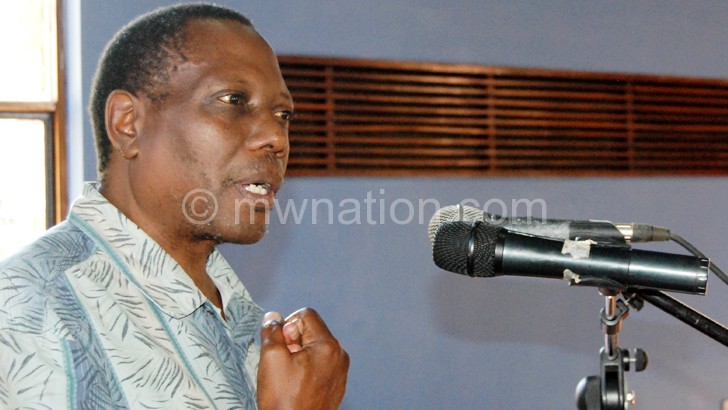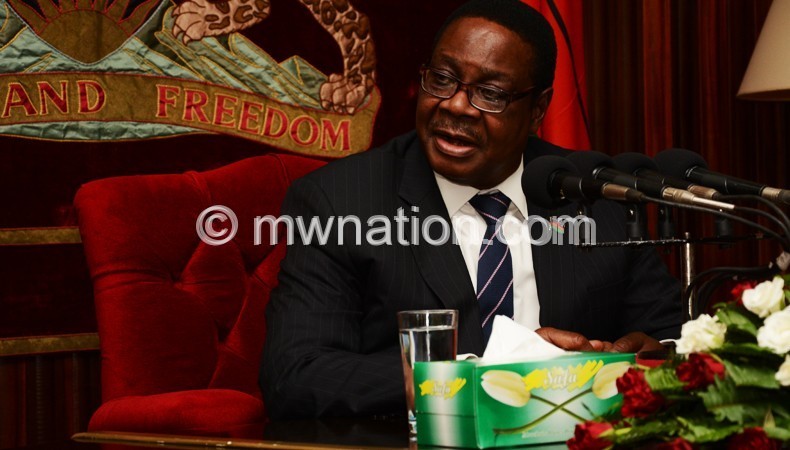Shut up, economist tells presidents
- Says economics should be left to experts
Professor Ben Kaluwa has attacked the country’s presidents for “acting” like economists when they are not, accusing them of blindfolding citizens.
Kaluwa, a professor of economics at the University of Malawi’s Chancellor College in Zomba, observed that every Malawian president has portrayed themselves as economic experts.

He was speaking in Zomba on Saturday in his presentation during a seminar on demystifying cannabis.
The seminar was organised by Kemet Forum—a network of citizens that discusses and disseminates hidden, distorted, misrepresented or unspoken truths about Africa—to initiate an intellectual conversation on whether Malawi should legalise the use and sale of industrial hemp.
Said Kaluwa: “All the presidents we have had assume that they know economics, which is rubbish; complete nonsense. They don’t know anything so they should shut up and leave that to people who know economics.”
He said it was because of such conceptions that the country has one of the highest import dependencies.
Kaluwa also said it was high time Cabinet ministers were appointed on merit and given the independence to make decisions.
Malawi has been governed by five presidents since independence from Britain in 1964. They are founding president the late Hastings Kamuzu Banda (1964-1994), Bakili Muluzi (1994-2004), the late Bingu wa Mutharika (2004-April 2012), Joyce Banda (April 2012-May 2014) and currently Peter Mutharika who assumed office in May 2014.

Out of the five, only Bingu was a trained economist with a doctorate degree in the field.
Over the years, the country has faced numerous economic challenges.
For example, during Bingu’s second term of office from 2009, the country faced one of its worst foreign exchange crises after falling out of favour with development partners. Malawians endured long queues at filling stations to buy fuel and some importers accumulated arrears as their banks could not pay foreign suppliers.
The country’s fiscal gap sharply widened by more than four percent and became one of the highest rates in Africa and also tumbled seven steps to 136 out of 148 economies.
Bingu dared economists to a debate and maintained he would not devalue the kwacha, then perceived to be overvalued.
However after Bingu’s death in April 2012, Joyce Banda heeded calls from local economists as well as the World Bank and International Monetary Fund (IMF) to devalue the kwacha. Her administration devalued the currency and subsequently floated it.
Overall, the Malawi economy, according to a World Bank report, grew an average of about six percent between 2008 and 2013 rising faster than several other African nations.
On legalising industrial hemp, Kaluwa said Malawi needed to take a bold step of cultivating the crop which stands to boost the economy.
He urged leaders to depoliticise the issue and allow competent Malawians to decide.
Ntchisi North member of Parliament (MP) Boniface Kadzamira (Malawi Congress Party-MCP), who revived the debate in Parliament and was the key speaker at the seminar, said legalisation of industrial hemp may sound unreasonable to some, but could be one of the most accurate entrepreneurial decisions as it is an important foundation stone for economic progress.
He said: “In fact, Malawi’s poverty is a product of our thinking and it can’t be changed unless we change our thinking hence this proposal to legalise industrial hemp as one of the critical progressive thinking.
“Our lack of progress is not because of lack of better ideas or better alternatives but because we have deliberately refused to correct weak spots in our system. We have been subjected to a system that prides itself in stagnation and unnecessary bureaucratic delays.”
Kadzamira said it was high time Malawi changed attitude, policy and legislation on cannabis to remove “misconceptions and manufactured fears” that industrial hemp was dangerous drug.
The legislator is pushing for the cultivation and use of industrial hemp, a type of cannabis that has little traces of tetrahydrocannabinol (THC), which is found in marijuana (another variety of cannabis that gets one high). n






why do Malawian leaders promote what promote donotation economy instead of Agriculture free growing hemp… And how can the New government self economy while forgetting to promote crops that empower us. America depend on war they go and kill half of the country just for the sake of enriching themselves. Yet we keep on asking question how to realize hemp for the betterment of our economy….its ironic economists system